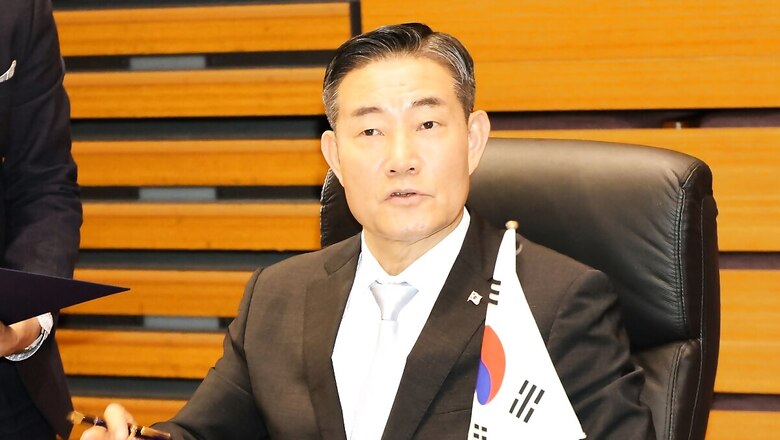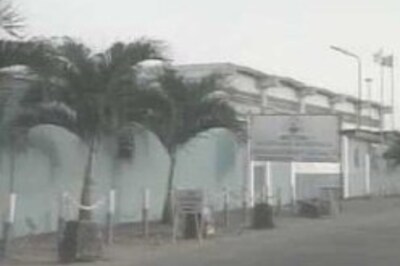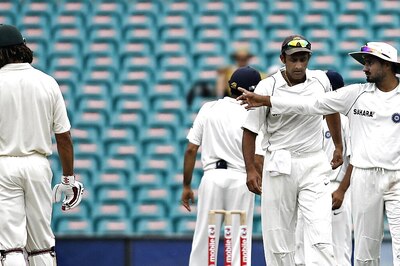
views
South Korea could rupture its U.S. alliance and shock financial markets if it started building nuclear weapons, Defence Minister Shin Won-sik told Reuters, dismissing renewed domestic calls for the country’s own arsenal to deter North Korea.
As the neighbouring North rapidly expands nuclear and missile capabilities, more South Korean officials and members of President Yoon Suk Yeol’s conservative ruling party have called in recent months for developing nuclear weapons.
The prospect of another term for former U.S. President Donald Trump, who complained about the cost of the U.S. military presence in South Korea and launched unprecedented talks with the North, has further fuelled the debate.
But Shin, a former three-star army general who also served as a lawmaker in Yoon’s party, said having a homegrown nuclear arsenal risked devastating fallout to the South’s diplomatic standing and economy, akin to what analysts called Black Monday this week for the stock market’s worst losses since 2008.
”You’ll face a huge crack in the U.S. alliance, and if we withdraw from the nuclear non-proliferation treaty, it would bring various penalties, starting with an immediate shock in our financial market,” he said in an interview.
Shin acknowledged that the debate among politicians and foreign policy experts was a sign that many South Koreans were still anxious about American extended deterrence – the U.S. military capability, especially its nuclear forces.
But the allies’ push to strengthen that deterrence is the ”easiest, most effective and peaceful” way to counter the North’s threats, he said.
PARADIGM SHIFT
Intensifying strategic rivalry between the United States and China and the Ukraine war have triggered a sweeping shift in the post-Cold War paradigm, putting South Korea near the centre of the turmoil and complicating its calculations, Shin said.
”Even in Northeast Asia, there are forces who are openly seeking to change the status quo by force, and we are at the forefront, directly affected,” Shin said, speaking at his office in Seoul, the South Korean capital.
South Korea responded by warning that it could consider arming Ukraine with lethal weapons, a potential shift from its policy of sticking to humanitarian and economic assistance, if Russia provides the North with advanced weapons technology.
Shin said North Korea received Russian assistance with a rocket engine used in a failed attempt in May to launch a spy satellite.
But he did not consider that to cross a ”red line,” saying he was focused instead on any transfer of technology linked with intercontinental ballistic missiles and nuclear weapons, as well as anti-air weapons, radars, tanks and fighter jets.
From last year until Aug. 4, North Korea has shipped more than 12,000 containers to Russia, enough to carry about 5.6 million 152-mm artillery shells, Shin said.
The actual number would vary because North Korea has sent three or four kinds of shells of different sizes, including rockets, and separately also supplied dozens of short-range missiles, he said.
While Yoon’s administration has been more open in echoing Washington’s calls for ”like-minded nations” to stand together in the face of tension with China and Russia, Shin said South Korea has not discussed joining other U.S. allies and partners in naval exercises in the South China Sea, where Beijing has clashed with neighbours over maritime claims.
TENSION ACROSS THE KOREAN BORDER
Tension between the neighbours has flared in recent weeks, after North Korea floated thousands of balloons containing trash in protest against South Korean activists sending anti-Pyongyang leaflets.
Seoul resumed its loudspeaker broadcasts near the border for the first time in 2018, blaring news and K-pop music, which Shin called an ”effective, stinging” form of psychological warfare.
Among newly added news was the surprising defection of Ri Il Gyu, who worked as a senior North Korean diplomat based in Cuba, and the participation of Jin, a member of the K-pop supergroup BTS, in the Paris Olympics’ torch relay.
”I understand that North Korea has been struggling to block BTS’ popularity as there was a craze among young people imitating their dances,” Shin said, declining to identify the source of the information.
”The loudspeaker campaign would have a long-term impact as a key catalyst in driving change in society, and could potentially provide a momentum for the North’s denuclearisation if we work more with the international community.”
Catch the latest developments on Bangladesh Unrest with our live blog.




















Comments
0 comment